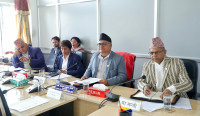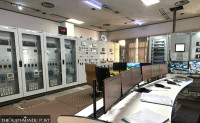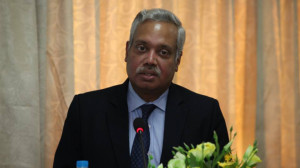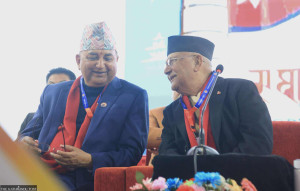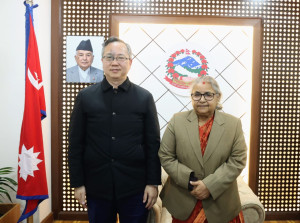National
Economy in free fall as exports, imports dip
Nepal’s exports and imports saw a free fall in the first four months of the current fiscal year after overland trade was largely paralysed by the ongoing Tarai unrest and an Indian trade embargo.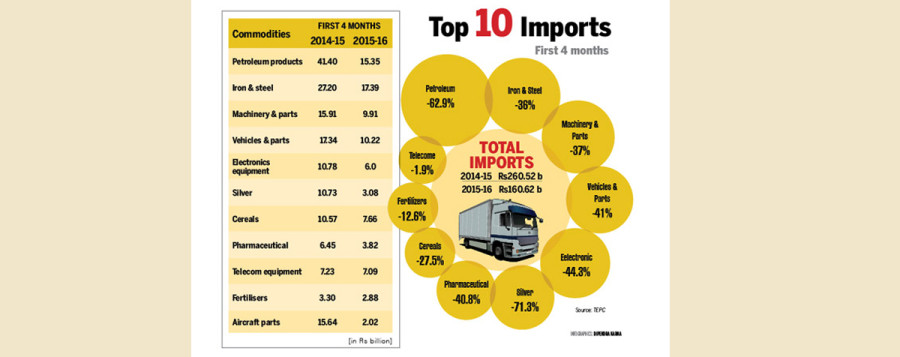
Nepal’s exports and imports saw a free fall in the first four months of the current fiscal year after overland trade was largely paralysed by the ongoing Tarai unrest and an Indian trade embargo.
As the country’s exports and imports plunged by 30.5 percent and 38.3 percent respectively, the total foreign trade has seen a dip by 37.5 percent, according to latest statistics of Trade and Export Promotion Centre (TEPC).
According to the data provided by the TEPC, trade from two neighbouring countries—India and China—fell sharply. Trade through Birgunj—Nepal’s main trade transit point—has been obstructed for the past 75 days.
Except gold, imports of all commodities saw a negative growth in the first four months of this fiscal.
A steep decline in import was seen in petroleum products. Import of petroleum products fell sharply by 62.9 percent to Rs15.35 billion in the first four months. Petroleum product imports bill was Rs112.16 billion in the fiscal year 2014-15.
Mukunda Ghimire, spokesperson for Nepal Oil Corporation, the state oil monopoly, said the country could import only 15 percent of the country’s total fuel needs due to border obstructions. All economic activities have come to a grinding halt due to the fuel crisis.
Economist Bishwamber Pyakurel said that fall in imports, mainly of the essential goods, has already shot up market prices and has resulted in thriving black-market.“In such scenario, the market could observe hyperinflation in the days ahead,” said Pyakurel. “From the government’s revenue to private sector’s earnings, everything has been affected severely, and negative economic growth is inevitable this year,” Pyakurel added. “Even if things go normal from here, it will take a long time for the country to recover from the current suffering.”
Pashupati Murarka, president of the Federation of Nepalese Chambers of Commerce and Industry, said all the industrial activities have been paralysed. More than 3,000 large and small factories have remained shut due to shortage of fuel and raw materials. The TEPC statistics show that import of iron and steel, the second largest import items after petroleum, also dipped by 36 percent to Rs17.39 billion.
Likewise, the import of machinery and parts plunged by 37.7 percent to Rs9.91 billion. Import of vehicles and its parts went down by 41 percent to Rs10.22 billion.
Meanwhile, the country’s export also decreased by 30.5 percent to Rs20.84 billion during the review period. The iron and steel products witnessed the biggest fall of around Rs3 billion. Export earnings from iron and steel products decreased by more than 60 percent to Rs1.61 billion.
Due to sharp fall in import, the trade deficit also fell down during the first four months. The country’s trade deficit dropped by 39.4 percent to Rs182.45 billion. Nepal’s foreign trade deficit was recorded at Rs697.94 billion in the last fiscal year.
The obstruction has hit import from both India and China, the major trading partners of Nepal. The statistics show that import from India dipped by 43.4 percent. Nepal imported goods worth Rs95.32 billion from the southern neighbour.
Likewise, Nepal’s import from China also dropped by 19.4 percent to Rs26.57 billion. Since the April 25 earthquake, Nepal’s trading route with the northern neighbour has remained closed.
Murarka said that traders have been hesitating to open new letters of credit as they are not sure when the problems would be resolved. “Few imports are being done through the LC that the traders had opened in the past,” said Murarka.




 9.12°C Kathmandu
9.12°C Kathmandu

